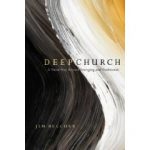Belcher, Jim. Deep Church: A Third Way Beyond Emerging and Traditional. InterVarsity Press, 2009. ISBN: 978083083716.
Jim Belcher is a Presbyterian (PCA) pastor who serves as the church planter and lead pastor of Redeemer Presbyterian Church in Newport Beach, California. He is co-founder of the Restoring Community Conference: Integration Social Interaction, Sacred Space and Beauty in the 21st Century, an annual conference for city officials, planners, builders and architects. Deep Church: A Third Way Beyond Emerging and Tradition is Belcher’s first book. He has written articles for Leadership Journal and re: generation quarterly. For more information visit the Deep Church website.
Book Basics
Recognizing that both the traditional church and the emerging church are imperfect models, Belcher presents deep church as a third way. Belcher borrows the term “deep church” from C. S. Lewis and uses it to describe his new alternative, which is more ancient than it is modern or postmodern.
In the first section of the book, Belcher provides an understanding of his own journey and how he was influenced by his experiences with the traditional and emerging churches. While the traditional church does not speak with a single voice, it is far more uniform in its views than is the emerging church. Relevants (i.e. Driscoll and Kimball) , reconstructionists (i.e. Hirsch and Barna) and revisionists (i.e. McLaren and Pagitt) offer the three primary voices of the emerging church (borrowing Ed Stetzer’s terminology). At the conclusion of this section, Belcher suggests that the “ecumenical, classical consensus” is a starting point for deep church.
and how he was influenced by his experiences with the traditional and emerging churches. While the traditional church does not speak with a single voice, it is far more uniform in its views than is the emerging church. Relevants (i.e. Driscoll and Kimball) , reconstructionists (i.e. Hirsch and Barna) and revisionists (i.e. McLaren and Pagitt) offer the three primary voices of the emerging church (borrowing Ed Stetzer’s terminology). At the conclusion of this section, Belcher suggests that the “ecumenical, classical consensus” is a starting point for deep church.
The second section of the book is the story of Belcher’s attempt to construct the deep church in theory and in practice. Each of the seven chapters (Deep Truth, Deep Evangelism, Deep Gospel, Deep Worship, Deep Preaching, Deep Ecclesiology, and Deep Culture) explore the traditional and emerging views and conclude with deep view. While offering critique of both standard options, the pastoral tone and plea for unity among these presently divided factions is perhaps the book’s greatest contribution to the church.
So What?
- Self-awareness and openness. Does your congregation fit best into the category of traditional, emergent or deep? How open are you to those with a different label when it comes to dialogue? partnering in ministry? pursuing unity?
- Self-understanding and prioritization. I am increasingly persuaded that Belcher’s call for churches to be centered-set rather than bounded-set (taken from Frost and Hirsch) is essential for ministry in a postmodern context. Centered-set churches understand what is at the center (Jesus Christ) and focus on the core purpose and values and have no need to construct walls or boundaries to define what is out of bounds. Conversely, bounded-set churches spend considerable energy determining exactly where the boundaries are and what constitutes proper belief or theology. Which better describes your congregation? How well does it work in your context?
- Postmodernity in its place. I am not fully satisfied with Belcher’s assertion that postmodernism is helpful for the deconstructive task, but ill suited for reconstruction. In some real ways he tips his hat to the presence and power of postmodernity by using it to help strip away the modern problems of the church, but then moves to the premodern classical consensus of the great creeds and traditions for reconstruction. It is workable but seems more forced than logical. What do you see as the rightful role of postmodernism in this discussion?
